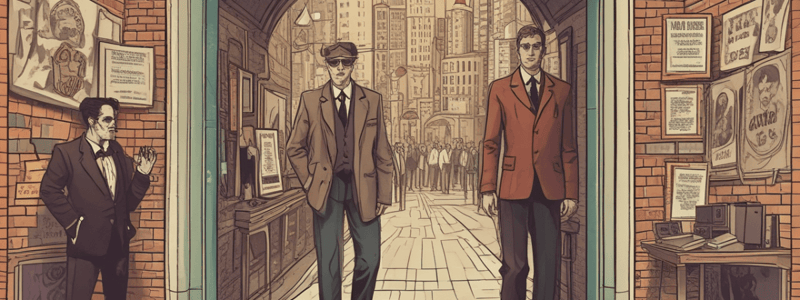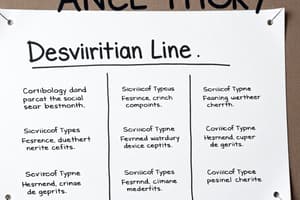Podcast
Questions and Answers
What is one criticism of Marxist theory in the context of crime and deviance?
What is one criticism of Marxist theory in the context of crime and deviance?
It is overly idealistic and difficult to apply to real life.
According to right realists, what motivates criminal activity?
According to right realists, what motivates criminal activity?
Opportunism rather than a reaction to perceived injustice.
What is the term for a social phenomenon that is created by a society and is not a naturally occurring result of evolution?
What is the term for a social phenomenon that is created by a society and is not a naturally occurring result of evolution?
Social Construction
Who introduced the concept of the relativity of crime and deviance?
Who introduced the concept of the relativity of crime and deviance?
What is the term for a person who commits an act that they know is deviant/criminal but no one else knows, and therefore no label is attached?
What is the term for a person who commits an act that they know is deviant/criminal but no one else knows, and therefore no label is attached?
What is the criticism of Marxist theory from a feminist perspective?
What is the criticism of Marxist theory from a feminist perspective?
What is the result of labeling according to Lemert?
What is the result of labeling according to Lemert?
What is the consequence of labelling a person as deviant according to the labelling theory of crime and deviance?
What is the consequence of labelling a person as deviant according to the labelling theory of crime and deviance?
What is the role of moral entrepreneurs in society?
What is the role of moral entrepreneurs in society?
What is the result of typificiations, according to Cicourel?
What is the result of typificiations, according to Cicourel?
What is the impact of master status on an individual?
What is the impact of master status on an individual?
What is an example of a historical period where cultural norms of deviance varied?
What is an example of a historical period where cultural norms of deviance varied?
What is the difference between formal and informal agencies of social control?
What is the difference between formal and informal agencies of social control?
What is the concept of self-fulfilling prophecy in the context of labelling theory?
What is the concept of self-fulfilling prophecy in the context of labelling theory?
How can labeling an individual as a criminal lead to a deviant or criminal career?
How can labeling an individual as a criminal lead to a deviant or criminal career?
What does the labeling theory emphasize in the context of crime and deviance?
What does the labeling theory emphasize in the context of crime and deviance?
What is a limitation of the labeling theory in explaining crime and deviance?
What is a limitation of the labeling theory in explaining crime and deviance?
What is another limitation of the labeling theory?
What is another limitation of the labeling theory?
How do realist approaches to crime and deviance differ from other theoretical perspectives?
How do realist approaches to crime and deviance differ from other theoretical perspectives?
What is a consequence of labeling an individual as deviant or criminal?
What is a consequence of labeling an individual as deviant or criminal?
What does the labeling theory reveal about the role of the powerful in crime and deviance?
What does the labeling theory reveal about the role of the powerful in crime and deviance?
Flashcards are hidden until you start studying
Study Notes
Marxism and Crime
- Marxism links crime to capitalism and racism, blaming scapegoats (e.g., Caribbean men) for social problems
- Marxist theory criticized for being overly idealistic and difficult to apply to real-life situations
Labelling Theory
- Social Construction: social phenomena created by society, not naturally occurring
- Relativity of Crime and Deviance (Becker): crime is relative and depends on social context
- Labelling Process:
- Primary Deviance: person commits a deviant act, but no label is attached
- Labelling: a label is attached to the person committing the act
- Secondary Deviance: person takes on the label and acts accordingly
- Consequences of Labelling: amplification of deviance, self-fulfilling prophecy, and deviant careers
Moral Entrepreneurs and Agencies of Social Control
- Moral Entrepreneurs: people who decide what is morally acceptable in society (e.g., ruling class, governments, law makers)
- Agencies of Social Control:
- Formal: police, courts, CJS
- Informal: peers, society
- Master Status: individual identified by a particular aspect of themselves (e.g., criminal), impacting their treatment in society
Evaluation of Labelling Theory
- Strengths: emphasizes social construction of crime and deviance, reveals role of powerful in crime and deviance, shows how deviant careers are established
- Limitations: deviant becomes victim, doesn't explain original deviance, doesn't explain stereotype origins, deterministic
Realist View of Crime and Deviance
- Realist approaches differ from other theories by providing practical solutions in addition to explaining causes of crime
Studying That Suits You
Use AI to generate personalized quizzes and flashcards to suit your learning preferences.




